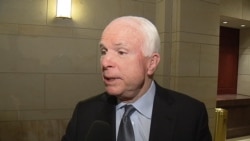Senator John McCain (R-AZ), a leading critic of Tuesday’s landmark nuclear accord with Iran, has conceded that the U.S. Congress is unlikely to be able to block the deal, despite strong opposition from Republican lawmakers who control both chambers.
McCain, chairman of the Armed Services Committee, told VOA “it’s doubtful, just doubtful” that enough Democrats would join with Republicans to override a presidential veto of congressional votes disapproving the deal.
Those votes could come in September, 60 days after lawmakers begin a review period of the accord. For now, opponents of the accord appear to outnumber backers, making initial simple-majority votes of disapproval likely. But overriding a veto would require two-thirds votes in both chambers, a far higher hurdle for congressional critics of the agreement.
Asked if the pact is essentially a done deal, given that Republicans lack the numbers to override a veto on their own, McCain said, “I think that is likely, but we won’t give up the fight.”
Political pressure
Congress has a contingent of strongly pro-Israel Democrats, many of whom have expressed deep reservations about a nuclear accord with Tehran. McCain said he expected the White House will “put enormous pressure on these Democratic senators” not to block the deal.
McCain said the accord unveiled in Vienna “only pauses Iran’s pursuit of nuclear weapons – the original intent was to prevent them.”
At the White House Wednesday, President Barack Obama said, “I can say with confidence, but more importantly, nuclear experts can say with confidence that Iran will not be in a position to develop a nuclear bomb. We will have met our number-one priority.”
He added, “With this deal, we cut off every single one of Iran’s pathways to a nuclear program, a nuclear weapons program. And Iran’s nuclear program will be under severe limits for many years. Without a deal, those pathways remain open. There would be no limits to Iran’s nuclear program, and Iran could move closer to a nuclear bomb.”
McCain dismissed the president’s argument that the deal is preferable to a continuation of Iran’s nuclear development unchecked.
“It’s roughly similar to the same thing [former British Prime Minister] Neville Chamberlain said when he came back from Munich [before World War II],” McCain said. “It [the accord] can only help the Iranians. It can only assist them in their effort to spread terror throughout the region.”
Support
Other lawmakers are defending the pact.
“For the first time, Iran’s nuclear activities have been reined in,” said Democratic Congressman Earl Blumenauer. “With this agreement in place, we will have more tools than we have ever had to inspect, monitor, and enforce – and more allies to make it work.”
“If the United States walks away from this agreement, it is certain that the countries that helped us reach this point will walk away too. Without this perfect alignment for punishing sanctions, they will fall apart and we will lose this moment,” Blumenauer added.
The president can waive or suspend sanctions against Iran, but only after the 60-day congressional review period and only if Congress either declines to vote on the deal or a vote of disapproval is not sustained. A future president could re-impose sanctions, a fact noted by some Republican presidential aspirants who have pledged to undo the deal if they win the White House next year.
Hearings coming
Both the Senate and House of Representatives are bracing for exhaustive hearings on the deal – a process that will be interrupted by lawmakers’ annual August recess, during which time they will hear from constituents. Although many Republicans already have signaled their opposition to the accord, other Republicans, along with most Democrats, are withholding final judgment, at least for now.
Independent Senator Angus King urged his congressional colleagues not to make any snap decisions.
“To denounce an agreement or a deal before the ink has even dried strikes me as an abdication of our responsibility,” King said. “Let’s slow down and take a deep breath.”
McCain acknowledged that Republicans have an instinctual distrust of anything bearing Obama’s stamp of approval.
“I think there’s a real lack of trust because of the record,” McCain said, pointing to the administration’s handling of Syria. “The president said that they’d crossed the red line – Bashar al-Assad with chemical weapons – and we did nothing. He [Obama] has no credibility with Republicans, but more importantly, no credibility with the Sunni Arab nations.”





